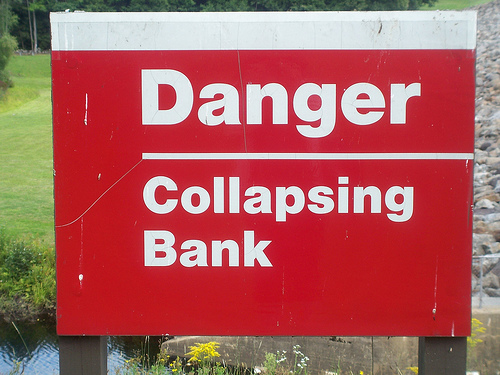
It's a phrase that has sprung to mind pretty often since the eurozone crisis started, and it now applies - in block capitals - to Spain.
The biggest Catch 22 for the Spanish government is also the most obvious.
Its cost of borrowing (the bond yield) goes up when financial markets worry that it will not get a handle on its budget deficit. But it also goes up when ministers talk about the tough measures they are going to take to get that deficit down, because of fears that spending cuts and tax rises will tank the economy and therefore be self-defeating.
It's a good example of the market's "schizophrenia" on the subject of fiscal austerity, highlighted by the IMF's chief economist at the end of last year and often debated.
But, as Goldman Sachs economists make clear in a recent, very thorough four-part analysis of the fiscal and competitiveness problems facing the European periphery, the Catch 22s for Spain go deeper than that, and they are even worse for Portugal and Greece.
I've bored you many times with the thought that the crisis economies have not just a fiscal problem, but a competitiveness problem, built up over their first decade in the euro.
To fix that latter problem, the Goldman Sachs team reckon that Portugal needs a real devaluation of around 35%. In other words, the nominal cost of Portuguese labour and other inputs has to fall by 35%, relative to their trading partners.
The equivalent figure for Greece is around 30%, while Spain needs a real depreciation of just over 20%, and Italy about 10-15%. Interestingly, they think this part of Ireland's adjustment is more or less complete.
To put these figures into perspective, the fall in the value of the pound in 2008 was one of the largest depreciations to have occurred in a major industrial country since the war - and produced an increase in UK competitiveness of around 20%.
So, Spain now has to pull off the same thing, but without changing its nominal exchange rate by one peseta - because, to state the obvious, it doesn't have pesetas any more. It has euros.
As I've also mentioned many times, achieving that kind of improvement without changing the exchange rate requires a long period in which domestic prices and wages in these economies are falling relative to other countries' - notably Germany.
Germany is not so keen on that part of the remedy.
President Sarkozy has started talking about the ECB again, and what it might do to help eurozone growth. He might ask it to pay less attention to German inflation for a few years - maybe halve Germany's share in the eurozone inflation index? But I digress....
German officials do tend to argue that structural reforms to improve the country's competitiveness will itself support growth - and, theoretically, help the budget.
That might be true in the long run. But in the short run, improving competitiveness is likely to make things worse, and not just because shrinking pay packets will tend to shrink the economy.
The other reason that improving competitiveness makes the fiscal challenge that much tougher, in the short run, is that, by definition, cutting (or slowing the growth of) domestic prices and wages has to slow the growth of domestic inflation - and therefore the cash value of national output.
That matters because, remember, all those crucial targets for the deficit and the debt are all measured as a share of nominal, or cash, GDP.
Other things equal, the slower the growth of nominal GDP, the more cuts and tax rises will be needed to bring those ratios down.
The numbers here are not small.
The Goldman Sachs analysis suggests that, other things equal, the output effects of restoring competitiveness could raise Portugal's debt to GDP ratio by around 35 percentage points over a decade, and the Greek ratio by around 30 points.
On this reckoning, both Spain and France could see a 10-15 percentage point rise in their public debt ratio over 10 years, from this factor alone.
So, you can see there are really two Catch 22s for Spain, which are even worse for Portugal and Greece.
The "austerity" Catch 22 is that tougher action to bring down the deficit will hurt the real economy, and could thus make their debt problem even worse.
The "competitiveness" Catch 22 is that tougher action to make Spain more competitive on world markets will almost certainly squeeze the cash value of the economy, which (you guessed it) is likely to make their debt problems even worse.
Here's the conclusion that Goldman Sachs draws, on the basis of its extended analysis:
"Our results suggest that, for some euro area countries - notably Greece and Portugal, but arguably Spain as well - the task of regaining fiscal and external balance through cyclical adjustment alone appears large, to the point of being insurmountable."
Or, to put it another way, these governments may well be damned if they do, and damned if they don't.
BBC
No comments:
Post a Comment